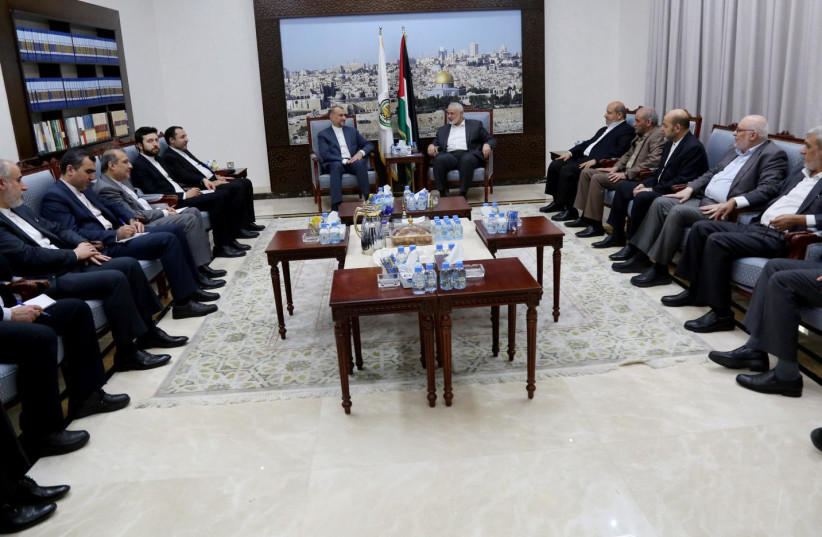‘Real progress’ in Palestinian unity efforts, says Abbas aide
Palestinian Authority (PA) President Mahmoud Abbas returned from a visit to Doha, Qatar, for meetings with the Emir and Hamas officials aimed at bridging the gap between the two factions, finding ways to reconcile, and discussing ways to form a technocratic government headed by the PA.
Sources say Qatar conveyed to President Abbas Hamas’ approval to form a technocratic government. The Islamist group’s initial response to join the Palestine Liberation Organization was conveyed on the condition that this is linked to a clear political horizon leading to an independent Palestinian state on the 1967 borders, with East Jerusalem as its capital.
“There’s real progress in this file, and Doha, Riyadh, and Amman are playing a critical role in advancing the efforts,” a Palestinian aide to Abbas told The Media Line.
The situation had remained frozen since 2007 between the two largest Palestinian factions when Hamas forcefully wrestled away control of Gaza. Until now, Palestinians’ political future seems more uncertain than ever.
The core of the divide between the two most dominant factions in Palestinian politics is their differing approaches to the Palestinian cause.

While Fatah, the largest and oldest Palestinian faction, and the PA, whose current leadership is one and the same, focus on cooperation with Israel, Hamas’ strategy is to confront Israel militarily, said Adel Shadid, a political analyst based in the West Bank. “Because of their different approach, the two can’t seem to be able to work or trust each other.”
Shadid told The Media Line that Abbas’ visit is “understood in the context of efforts to form a technocratic government, which cannot succeed or advance without Palestinian consensus first, then regional and international consensus.”
The PA’s support is waning, and Abbas, who heads Fatah, has seen his popularity decline.
“I think that President Abu Mazen (Abbas) has an interest in the matter as long as pressure is now being exerted on him regarding the renewal of the PA and reforms,” said Shadid.
According to Israeli Prime Minister Benjamin Netanyahu, Israel’s stated objective for the war is to destroy Hamas’ political and military capabilities, crushing any chance for the group to rule the coastal enclave.
Despite the US and the international community’s insistence, Netanyahu made his position clear about the PA having a role in the “day after” in Gaza. Netanyahu has repeatedly expressed opposition to the PA regaining control of Gaza after the war, declaring that Gaza must be demilitarized and stating that Israel wants to create a buffer zone inside Gaza to prevent a repeat of the October 7 attack.
The veteran premier has also ruled out the idea of foreign peacekeepers, saying that only the Israeli army can ensure that Gaza remains demilitarized.
However, the return of the PA to the beleaguered coastal enclave has not been completely ruled out and is being touted as a possibility.
The PA has one significant thing, says Dr. Amjad Abu el-Ez, a lecturer in international relations at the Arab American University in Ramallah, the West Bank, and that’s that Hamas lacks international recognition and support. Also, he says, the PA receives funding and tax revenues. But Abu el-Ez explains that returning to Gaza can’t come with the help of the Americans and Israelis.
“The Palestinian people will never accept an entity that enters Gaza on an Israeli tank to rule them. That’s a big no for them,” he said.
Abu el-Ez says the notion that Israel can destroy Hamas is “nonsense,” and the group is part of the fabric that makes the Palestinian political scene.
“There are Palestinian efforts to strengthen the role of the Palestinian organization in the Arab world.” He adds that a technocratic government that includes both factions is the best solution out there. “It succeeds for two reasons. Both are beneficial, meaning no type of reconstruction can be done without approval.
“But the legal issue—or the international dimension is—will the US and the Arab countries accept Hamas being involved in the ruling of Gaza? I believe that there is no other choice but to,” said Abu el-Ez.
Support for a Hamas-run Palestinian government
According to a recent poll conducted by the Palestinian Center for Policy and Survey Research in Ramallah, 89% of Palestinians support establishing a government that includes or is led by Hamas.
Prime Minister Mohammad Shtayyeh announced a comprehensive reform program last month aimed at revitalizing the PA amid US pressure that changes be implemented before Ramallah can take control of Gaza once fighting there concludes.
Some Palestinians doubt the seriousness of both factions reconciling, saying they are forced to do it for self-perseverance.
“I think that the real test is the extent of the two parties’ ability to reshape the PLO—provided that President Abu Mazen abandons his conditions before Hamas joins the PLO—as long as the PLO is an entity that includes all the components of the Palestinian people and is not the monopoly of a specific party that imposes its conditions,” said Shadid.





Comments are closed.